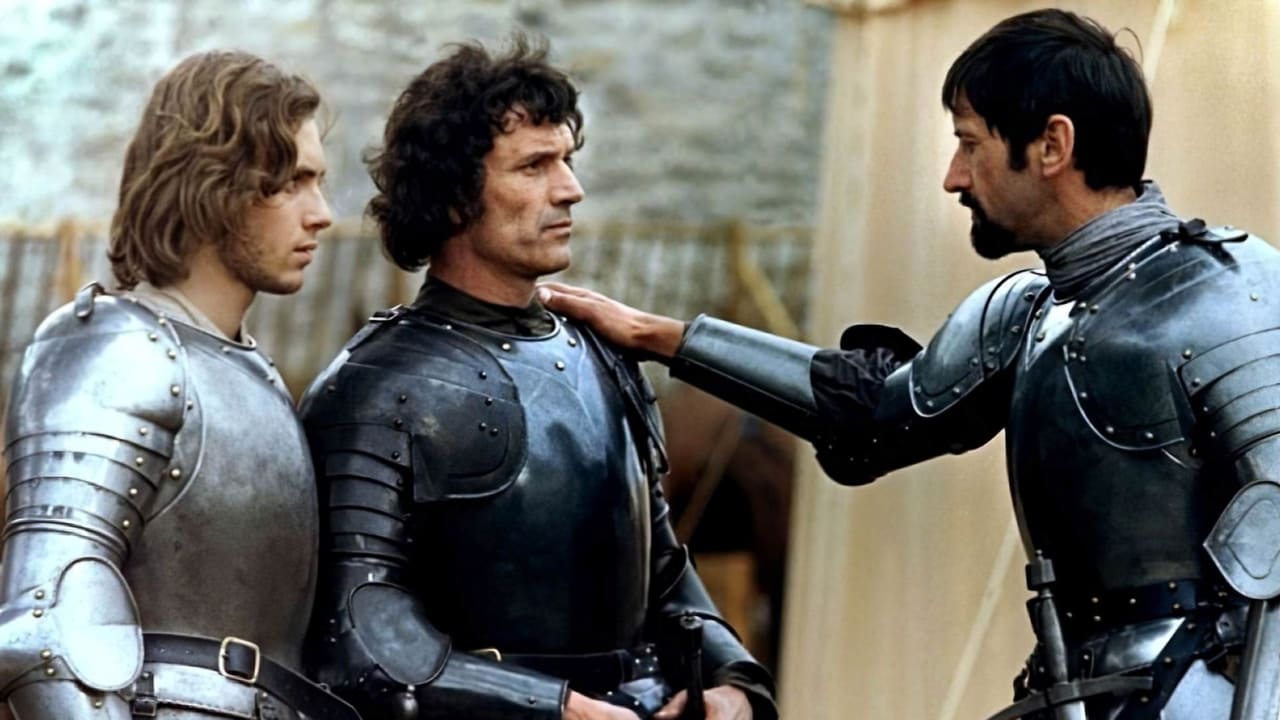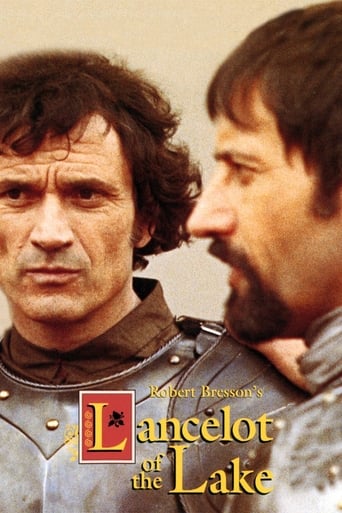AboveDeepBuggy
Some things I liked some I did not.
SpuffyWeb
Sadly Over-hyped
Chirphymium
It's entirely possible that sending the audience out feeling lousy was intentional
Brooklynn
There's a more than satisfactory amount of boom-boom in the movie's trim running time.
MacAindrais
Lancelot du Lac (1974) It is my contention that Robert Bresson's films are not so much films as they are philosophical essays stroked out on celluloid. They are often contemplations on the soul, usually of its destruction. His films are highly stylised in that they are without any style at all. Many of the actors he used acted in the film in which he cast them. He left out what would usually be considered key moments in a plot, making them difficult, but always fascinating. He never failed in what he tried to achieve, though that doesn't mean they were all always really that enjoyable, especially If you approach them as you would any other movie anyway. They are an acquired taste, and frankly require a certain degree of intelligence. I don't say that to sound pretentious, but to merely point out the observation that to have to think about something requires a certain amount of intelligence.In 1974 Bresson applied his philosophic sensibilities to a legendary tale. He took the famous Arthurian story of Lancelot's affair with Arthur's Queen, Guinevere. Of course, everyone knows the story, so I will not bother describing the plot so much as examine how it's executed. Bresson stripped all the lustre and romanticism from the story. Instead, he chose to emphasize the grime and cold-bloodedness. In the opening shot, he has Knights battle each other, hammering their swords against their armour until they strike flesh. Blood pours out like water from a faucet. It is a poignant gesture that Bresson begins (and ends) his film with inexplicable and horrific violence.Bresson turns ups the sounds of metal scraping on metal as the knights move around. He makes them look almost silly in their shuffling motions. Their pride is a foolish one. Instead of noblemen, Bresson shows them as petty and manipulative. They conspire to kill Lancelot, not by challenging him to a duel, but by waiting for him to exit the Queen's room where, armed or not, they declare he'll be too caught off guard to put up a fight before he is run through. Even Lancelot is ashamed, for he has returned from his quest to find the Holy Grail a failure. His trespasses with the Queen, even if it is true love, are doomed to tragedy because of foolhardy nobility.Though parts of the film take place in a castle, Bresson wastes no time with an establishing or grandiose shots. Even in battle, most scenes are reactionary. He makes it a point to show the knights lifting and closing their face masks as they speak with one another or prepare for war. The repetition somehow acts almost as satire. I think Bresson recognized the asinine behind the legendry.Lancelot du Lac was one of Bresson's most abstract films. It was in many ways an exercise in deconstruction that would have done Derrida proud. It obviously must has been quite influential. When I first saw Terrence Malick's The New World, I instantly thought that it must have been influenced in some way by Lancelot du Lac. That film stripped the story of Pocahontas and John Smith to its bare essentials - albeit not to the extent that Bresson goes, but still. There is one scene in The New World which reminded me very much of Lancelot du Lac, the one in which Smith wades through a swampy forest in his clunky armour only to be bested by the nearly nude naturals. He looks foolish trying to navigate and murky forest in such clunky attire. Now whether or not the film was an inspiration or if Malick has even seen it, I cannot confirm (though I suspect he has - his knowledge of cinema is extensive) Bresson often shows his knights gallivanting in the forest, wearing armour as a formal attire in situations that do not require it, other than to shout, "look at me, I am a Knight of King Arthur's Court!." Sure they offer some added protection, but they are still no match for death - as Bresson points out by showing us at the beginning and at the end (purposefully placed no doubt) how blood finds ways to spray from the openings and holes in plates of armour. Their armour is simply a token of their supremacy over the common man.Lancelot du Lac is Bresson's way of showing us the grandiose self-importance the Knights of King Arthur's Court presented upon themselves, and continues to be placed upon them by fairytale romanticism. When Lancelot asks for help to overcome his temptations from God, it is not for holiness or piety, but his own mortal self-preservation. Their quest for the Grail and their military victories have granted them fame and reputation. They squander what gifts they have been given to defeat one another. On one side, for the sake of Arthur against Lancelot; on the other for the sake of the Queen and Lancelot against everyone else. In the end when Lancelot concedes and returns the Queen to Arthur in exchange for her pardon, a group of Knights turn against the King at his moment of weakness. Now then Lancelot and his men return to fight for Arthur against the usurpers. It is a cycle of battle, or to be more to the point, competition. Throughout the film the Knights are preoccupied with competition in some form - jousting, declaring duels, chess, the love of the queen. They feast on an appetite of destruction.All is done in the name of Christianity in Arthur's court, but Bresson leaves much of that to subtlety. One shot of Lancelot is framed in the foreground by a crucifix, out of focus on purpose. Guinevere responds that the Knights were looking for God as a trophy - yet God is not a trophy. The Knights have simply taken Christianity as their flag in a battle for self-supremacy, not any theological quest.
dbdumonteil
In Robert Bresson's short filmography, "Lancelot Du Lac" is probably his most dismissed piece of work for evident reasons. The author of such pearls like "Journal d'Un Curé De Campagne" (1951) and "au Hasard Balthazar" (1966) chose to adapt his minimal, inimitable style to the fabled tale of the Knights of the Round Table with Lancelot's adulterous love for the Queen Guenièvre. Was it an appropriated choice for a topic whose treatment inevitably required greatness, heroism, violence pertaining to a chivalrous tale?Well, viewers who aren't familiar with Bresson's genuine cinematographic approach won't approve of it with a basically epic story and the filmmaker seemed aware of it given his cinema is everything but spectacular. But the auteur pushed his ideas to the extreme. So, we have here an austere view of a story usually full of greatness with very little action. The film opens and ends after a fight with bodies falling down, horses running and a desolate battle ground in the heart of a deep green forest. In the middle of the film, the audience will be allowed to watch a tournament which Bresson will reduce to its simplest elements with flags waving, Gauvain and Arthur's looks, shots on some of the horsemen's characteristics like their horses' legs or their armors. Once again as in many Bresson's works, ellipses are given priority. When the two adversaries collide, one can't properly see the action but just the before and after.Between these rare, fragmented action sequences, the rest is devoted to an aging Lancelot and his relationships with Queen Guenièvre, King Arthur, Gauvain and the other knights. Proud characters have given way to weary ones. The Quest for the Holy Grail was lost and Lancelot attributes this defeat to the guilty love he has for Guenièvre. And he is torn between this serious mistake and the chivalrous demeanor he should adopt for Arthur. Gauvain is stuck in a similar situation between his respect for Lancelot and Arthur with whom he wants to remain faithful. Like in other Bresson works, redemption has a sizable role. Towards the end of the film, Lancelot wants to redeem himself by fighting with Arthur against Mordred. Animals also seem to play a small but vital role. A magpie is often on the branch of a tree facing the Queen's bedroom.It's no wonder this dry overhaul of the Knights of the Round Table baffled many viewers, especially the ones who have never heard of Bresson. Lines full of bitterness, regret or suspicion are recited by models with a monotonous voice and a stone-cold acting lead a film mostly deprived of action and violence. That's why I would only recommend it to Bresson's die-hard aficionados and not for newcomers who will be better served with John Boorman's "Excalibur" (1981).
hackberry1
Truly one of the most inadvertently funny movies I have ever seen. Opens with way too many nearly identical scenes of knights in full plate armor galloping toward each other in the forest and knocking each other off their horses.Back at the castle, the knights are shown lounging around, eating, and engaging in conspiratorial whisperings--while still in full armor! Even the love scenes! All dialogue is in that French monotone barely above a whisper, whether declaring passionate love or discussing the weather, that seems to be meant to represent nothing more than the profound sensitivity of French culture.Unlike some Americans, I don't hate the French--their culture and outlook are a bright spot in our lockstep world--but the pomposity and self-importance of this movie are over the top.
droptonics
A lot of people are complaining about this film and for good reason. It's a difficult film but a worthwhile one at that. Bresson's Camelot is a horrible place to be. Arthur and his knights are unintentionally making everyone around them suffer by their visions of what the great society Camelot should be. The emotion is drained because they have killed for so long, compromising and losing sight of their initial quest. The movie is by far the most thematically challenging and different of the King Arthur operas, but it's definitely better than the recent film and on par with John Boorman's Sexcalibur. This film should be seen only by those with a true appreciation for art films and not those seeking to be entertained, they are two different mediums.

